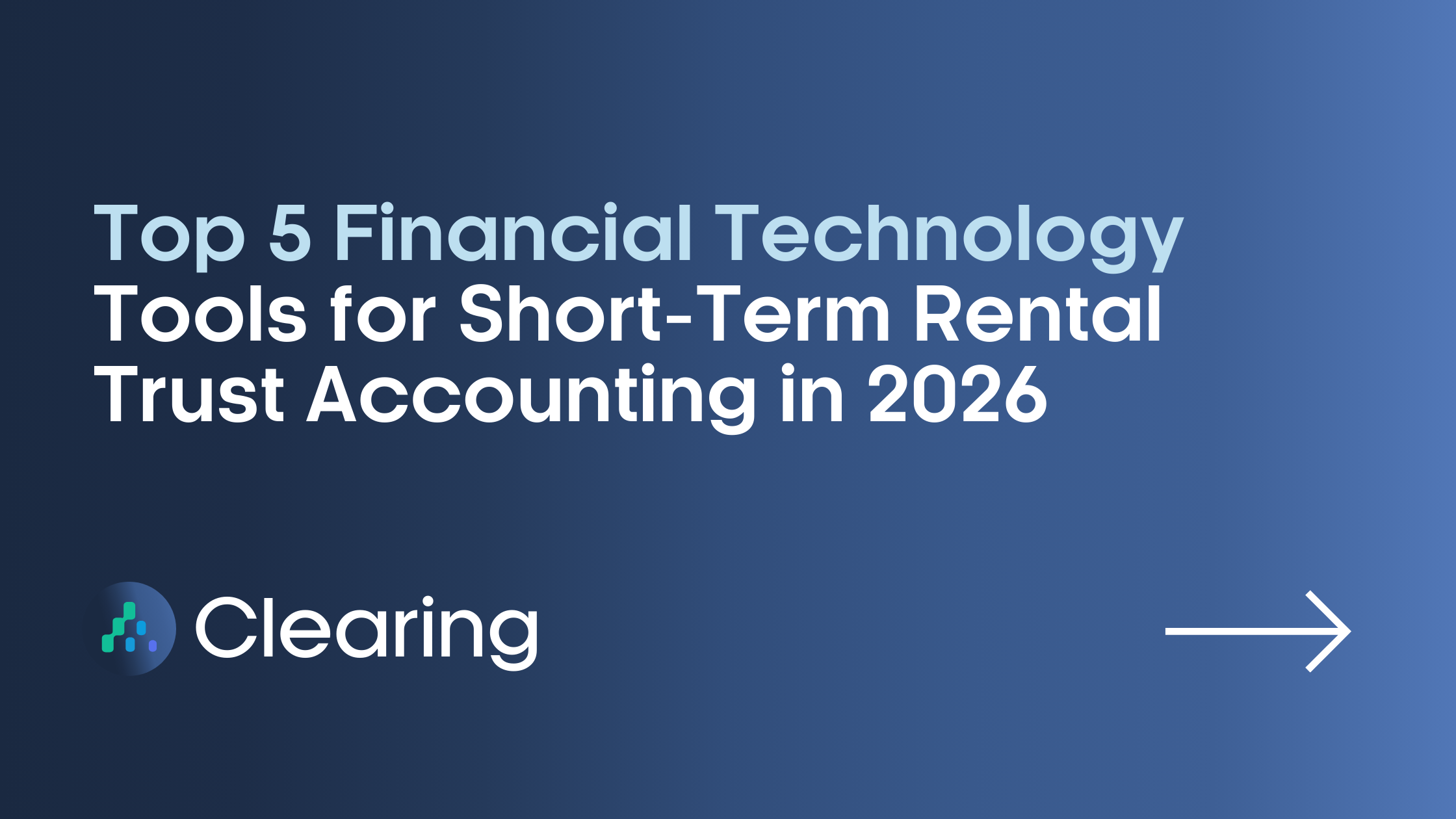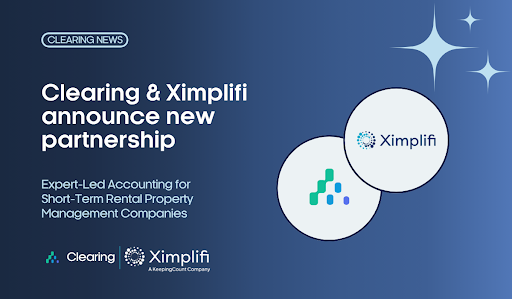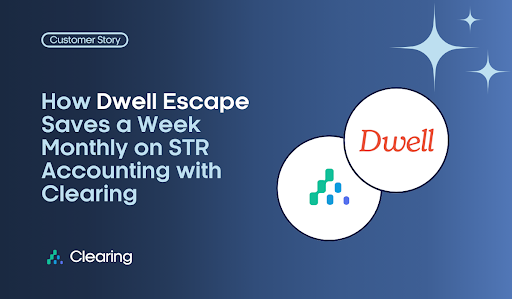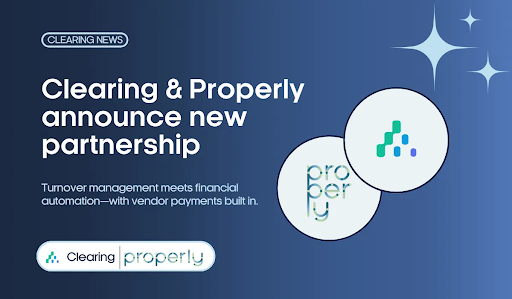Understanding Trust Accounting: Rent Pre-Payments, Booking Deposits, and More
Uncover the secrets of effective Short-Term Rental Trust Accounting. Learn how individual accounts, fund categorization, and Clearing's tools can boost your financial transparency and trust with guests and homeowners in the vacation rental industry.
November 10, 2023
Michelle
%20(1).png)
Effective financial management of a client's trust account assets is not just a best practice in a Short-Term Rental business; it's a cornerstone for success. Property managers operating in this fast-paced environment understand the critical importance of trust accounting. Short-Term Rental trust accounting, involving trust accounts specifically designed for Short-Term Rentals and vacation properties, is more than just a financial procedure; it's a fundamental aspect of the business that ensures financial transparency, security, and trust among homeowners, guests, and property managers.

In this blog, we will dive deep into Short-Term Rental trust accounting, exploring everything from the management of prepayments to the use of individual accounts for each vacation rental property. So, let's begin this exploration of trust accounting for short-term and vacation rentals, where every dollar has a purpose, and transparency reigns supreme.
The Basics of Trust Accounting
Trust accounting is a specialized financial approach, primarily used in the property management industry, especially in the realm of Short-Term Rentals (STRs) and vacation properties. It revolves around the practice of securely holding and managing funds on behalf of property owners, ensuring these funds are used for their intended purposes. This involves meticulous record-keeping, transparency, and adherence to legal regulations.
Short-Term Rental Trust Accounting vs. Regular Accounts
Trust accounts for Short-Term Rentals and vacation rentals significantly differ from regular financial accounts, such as standard checking or savings accounts. Trust accounts are exclusively dedicated to safeguarding funds associated with individual homeowners of vacation rental properties being managed by a property manager. These accounts prevent the commingling of client funds, making it crystal clear how much money belongs to each client, each property, and defines its distinct purpose.
Trust accounting is indispensable in the short-term property management landscape. It guarantees that funds, especially prepayments from guests, are safely held in individual accounts, separate from the property manager's operational funds. This separation ensures that the money collected in advance is not only secure but also easy to track and allocate. Trust accounting in the Short-Term Rental industry serves to build trust and transparency among property owners, managers, and guests. Additionally, it assists in legal compliance, financial management, and the efficient disbursement of funds to homeowners and vendors.
Managing PrePayments with Trust Accounting for Short-Term/Vacation Rentals
Prepayments, a common practice in the Short-Term Rental industry, involve guests paying for their stay in advance. These prepayments often encompass booking deposits, reservation fees, or full rental charges. They serve several vital purposes. First, they secure the booking, preventing last-minute cancellations or no-shows. Second, they offer financial stability to property managers by providing upfront revenue. However, managing these prepayments effectively is crucial to maintaining the trust of guests and homeowners, and to ensure legal compliance.
Utilizing Trust Accounting for Prepayments
Trust accounting plays a crucial role in managing prepayments, ensuring they are held securely and allocated appropriately. When guests make prepayments for their stay, these funds are deposited into a trust account dedicated to the specific property they've booked. This separate account keeps the pre-payment separate from the property manager's operational funds, guaranteeing it's readily available for the property owner and for expenses related to the guest's stay. The property manager becomes a trusted custodian, responsible for overseeing these funds until they are rightfully distributed.
Advantages of Trust Accounts for Booking Deposits
Trust accounts offer a range of advantages for handling booking deposits. First and foremost, they ensure the safety and security of guest prepayments. Funds are held in a protected account, reducing the risk of misuse or commingling with operational funds. Additionally, trust accounts make it easy to track and allocate funds, enhancing transparency and accountability. They also facilitate prompt and accurate disbursements to property owners, ensuring they receive their revenue promptly, leading to a positive and trustful owner-manager relationship. By managing prepayments through trust accounting, property managers can build trust with both property owners and guests, ensuring financial compliance and boosting operational efficiency.
Individual Accounts for Individual Vacation Rental Properties
One of the key principles of effective trust accounting in the Short-Term Rental sector is the use of individual accounts for each vacation rental property or homeowner. Managing vacation rental properties involves an intricate web of financial transactions. To ensure accuracy, accountability, and transparency, it's paramount to maintain distinct accounts for each property. Individual property accounts serve as dedicated repositories for funds related to a specific vacation rental. This approach is particularly valuable because it safeguards property-specific revenue streams and expenses. It's crucial not to combine funds from different properties, as it can lead to financial complications and mistrust among property owners.
Enhancing Financial Transparency
Individual accounts significantly contribute to financial transparency. By segregating funds according to each property, property managers can effortlessly track income and expenses for each rental unit. This granularity allows for a clear, detailed overview of the financial health of each property. Property managers, property owners, and regulatory bodies can easily access and verify financial records. This transparency not only fosters client trust but also ensures compliance with financial regulations and tax obligations.
Benefits of Categorizing and Classifying Funds
Categorizing and classifying funds for each property is a practice that elevates trust accounting for Short-Term Rentals. Funds received from guests, including prepayments and reservation fees, are sorted into specific categories associated with individual properties. This detailed classification provides property managers with a comprehensive understanding of the financial status of each vacation rental. It also simplifies the allocation of funds for various purposes, such as property maintenance, utilities, and owner revenue disbursement. In essence, categorizing and classifying funds ensures that every dollar has a defined purpose and destination, minimizing financial discrepancies and fostering trust among stakeholders.
The Role of Short-Term Rental Trust Accounting in Building Trust
Fostering Trust Among Stakeholders
Trust accounting is the cornerstone of trust in the Short-Term Rental industry. It lays the foundation for harmonious relationships among homeowners, guests, and property managers. Homeowners trust that their property's finances are handled with integrity and diligence, guests believe that their prepayments and reservation fees are secure, and property managers build trust by maintaining transparent financial operations and accurate records.
The Power of Transparency
Transparency is a linchpin of trust accounting. Property managers are expected to maintain clear, open, and precise financial records. This transparency ensures that all stakeholders are well-informed about the financial aspects of each vacation rental property. It builds a sense of confidence and reliability. Homeowners can easily access financial statements, showing the income and expenses associated with their property. Guests can verify that their prepayments are reserved for their stay. Property managers can demonstrate their commitment to financial integrity.
Trust Accounting Procedures
Step 1: Understanding the Fundamentals of Trust Accounting
To initiate trust accounting for Short-Term Rentals, property managers must first comprehend the fundamental principles of trust accounting. This includes recognizing the legal and ethical obligations involved in handling funds for homeowners and guests. The process should adhere to industry regulations and guidelines to ensure compliance with legal responsibility.
Step 2: Establishing Individual Trust Accounts
One of the core tenets of trust accounting for Short-Term Rentals is maintaining individual trust accounts for each vacation rental property or their homeowner. This practice enhances financial transparency and ensures that the funds for each property are meticulously tracked.
Step 3: Categorizing and Classifying Funds
Properly categorizing assets and classifying funds is vital for effective trust accounting. Property managers need to allocate funds to specific categories of accounts, such as prepayments, security deposits, maintenance fees, and more.
Step 4: Handling Prepayments and Booking Deposits
Managing prepayments and booking deposits is a critical aspect of trust accounting. This includes the secure collection, segregation, and responsible management of client funds due from guests. This step will offer a robust foundation for property managers to ensure these funds are appropriately safeguarded.
Step 5: Software Solutions for Trust Accounting
Utilizing trust accounting software can significantly streamline the process. These platforms offer property managers the tools needed for efficient management and reporting. Property managers need a deeper understanding of the benefits of adopting these software solutions.
How Clearing Helps in Short-Term Rental Trust Accounting

While understanding the principles and benefits of trust accounting in the Short-Term Rental (STR) industry is vital, it's equally important to have the right tools and solutions to effectively implement and streamline this financial practice. This is where Clearing comes into play, offering a comprehensive platform designed to simplify and enhance Short-Term Rental trust accounting compliance.
Clearing provides property managers and homeowners with a robust set of features tailored to the specific needs of the STR industry. Here's how Clearing can help you manage trust accounting effectively:
1. Automated Trust Accounting
Clearing offers an automated trust accounting system that seamlessly handles the segregation and management of funds related to individual vacation rental properties. By automating this process, you can ensure accuracy, maintaining accurate records and compliance with trust accounting rules while saving time and effort.
2. Individual Property Accounts
Clearing enables property managers to create and maintain individual virtual accounts for each vacation rental property. This approach aligns with the best practices for trust accounting and record keeping, ensuring complete transparency and the segregation of funds for different properties.
3. Categorization and Classification
Clearing's platform allows you to categorize and classify funds with ease. Funds received from guests, including prepayments and reservation fees, can be sorted into specific categories associated with individual properties, making it simple to track income and expenses for each rental unit.
4. Booking Deposit Management
Managing prepayments and booking deposits is made more efficient with Clearing. You can securely collect, segregate, and manage these funds, reducing the risk of misuse or avoiding the mixing of client funds with operational funds.
5. Owner Portal for Collaboration
Clearing offers a secure owners portal which allows homeowners and real estate investors to monitor their properties finances at any time. Owners can login and pull owner statements for any time range, allowing them to always have transparent insights into the financial state of each of their investments.
In conclusion, trust accounting is the linchpin of financial integrity and trust in the dynamic world of Short-Term Rental properties. This specialized financial practice, involving individual accounts for each vacation rental property and the meticulous categorization of funds, ensures that every dollar serves its intended purpose. Trust accounting not only enhances transparency but also fosters trust among homeowners, guests, and property managers. It's the cornerstone for harmonious relationships and compliance with industry regulations. Furthermore, with the support of cutting-edge platforms like Clearing, property managers can streamline trust accounting with automated systems and ensure accuracy and efficiency in managing these critical funds.
Are you ready to take your Short-Term Rental trust accounting to the next level?
Explore Clearing, the ultimate solution for enhancing your financial management practices in the world of Short-Term Rentals. With Clearing, you can automate trust accounting, maintain detailed records of individual property accounts, and effortlessly categorize and classify funds.
Want to see it in action?
Request a free personalized demo to discover how Clearing can revolutionize your trust accounting, ensuring transparency, security, and trust among all stakeholders in your Short-Term Rental business. Don't miss out on the benefits of Clearing - take the first step towards financial success today!
Clearing is a Financial Technology Company, not a bank.







.png)
.png)
.png)

.png)

.png)


.png)
.png)
.png)
%20(1).png)
%20(1).png)
%20(1).png)
.png)
%20(2).png)
%20(1).png)
%20(1).png)
.png)

.png)
.png)
.png)
%20(1).png)
.png)
.png)
.png)
.png)
.png)
.png)
.png)
%20(1).png)
.png)
.png)
.png)
%20(1).png)
%20(1).png)
%20(1).png)








.jpg)
%20(1).png)
%20(1).png)
%20(2).png)
%20(1).png)

%20(1).png)
%20(1).png)
%20(1).png)



%20(1).png)
%20(1).png)
%20(1).png)
%20(1).png)
%20(1).png)


%20(1).png)
%20(1).png)
%20(1).png)
%20(2).png)
%20(2).png)



%20(2).png)


%20(2).png)
%20(1).png)
.png)


%20(2).png)
%20(2).png)

.jpg)
.png)
.png)
.png)



.png)
